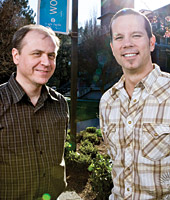 |
|
Spring 2010 | Volume 33, Number 1
| Features
|
|
|
Tools for Leaders
SPU Program teaches leadership with character
Rob McKenna ’90 says he’ll never forget the day Paul Yost ’87, a researcher at Boeing, came into his faculty office at Seattle Pacific University. It was 1999, and their conversation changed the direction of McKenna’s teaching and scholarship.
Yost wanted to hire McKenna as a consultant. “Paul was going to study 120 business executives at Boeing to figure out how they developed as leaders,” recalls McKenna. “He said he wanted to use the research to build a set of tools that could apply to leaders across business and churches. And then he said something else: He wanted to study pastors, too.”
It was this last part that hooked McKenna. He had just
finished his doctorate, during which he compared the leadership acumen of those in business and those in ministry. He says, “It was like God was saying, ‘Here’s what I’d like you to do, and who I’d like you to work with for a while.’”
For more than 10 years, these two SPU alumni, who had never met each other before, have worked together. McKenna
is now chair of Seattle Pacific’s Industrial/Organizational Psychology (I/OP) Department, and four years ago, Yost joined SPU as an associate professor of I/OP. Together with Professor Margaret Diddams and Assistant Professor Joey Collins, they make up the faculty of one of the only I/OP programs in the Northwest and the first I/OP doctoral program at a Christian institution in the country.
Just what is industrial/organizational psychology — and what does it have to do with leadership? “I have trouble explaining it to my mom,” jokes Yost. “In simple terms, it’s the scientific study of people in the workplace.” For decades, I/OP scholars have conducted research and amassed data about leaders and organizations — including what makes them succeed or fail.
“Seattle Pacific’s program is rigorous and relevant — designed to meet the exacting professional standards of our guild, the Society for Industrial and Organizational Psychology of the American Psychological Association,” explains Míchéal Roe, dean of the SPU School of Psychology, Family, and Community. “Professors and students create research-based tools and resources for emerging leaders, and conduct boundary-pushing consultations, workshops, and summits.”
Today, when so many leaders have publicly demonstrated ethical failures, the research SPU’s program is doing is as relevant as ever. “Bad leaders can destroy teams, and good leaders can completely turn them around,” says Yost. Employers need tools that can measure character as much as competency. And leaders need tools to help navigate difficult situations as they happen.
“Our research shows that leaders develop on the job, in real time, at the edge of themselves, when many people are watching, and when failure is a very real possibility,” says McKenna. “Whether you are a pastor or a business leader, you learn at that edge.”
Because of the day-to-day challenges leaders face, the I/OP faculty at Seattle Pacific and their nearly 70 students keep real-world application in mind — throughout their research, teaching, and learning. Students learn what research says about how to build an effective team, how leaders grow over their careers, and the best predictors of a satisfied and productive workforce. Then they put what they’ve learned to work.
Under the guidance of McKenna and other faculty members, teams of students go into local companies in fields such as technology, aviation, health care, and banking, and into nonprofit organizations and public institutions. There they conduct research, consult, and produce tools for employees and leaders.

Paul Yost (left) and Rob McKenna observe leaders in their natural environments. |
For example, faculty and doctoral students might study new managers at Microsoft and recommend how to improve their transition process. Another team might review the growth of Boeing’s leaders, and then create a web-based development process for them.
“Not every organization has the resources or skilled personnel to be able to follow a rigorous protocol,” says Tanya Boyd,
an I/OP doctoral student and instructor in management at SPU. Instead, students see how research-based solutions fare in the messy workplace.
Such edge-of-their-comfort-zone learning can bring up ethical questions, including what constitutes valid data, and how that data should be used. “You wield a lot of power with data,” says Janet Williams Hepler, a 2008 graduate of the program who works for Microsoft. “You’re called to use it with integrity.”
An emphasis on leadership character is the key to the I/OP program at SPU. “The program is values-explicit,” says Roe. “Our master’s and doctoral students not only graduate as scholar/practitioners ready to build, motivate, and lead organizations, but they also carry the SPU imprimatur of vocation and deeply held convictions regarding faith, character, and work-life balance.”
Not just students, but faculty members too, take this approach to strengthening leaders who are making decisions in today’s complex work and ministry environments. In December 2009, McKenna co-directed a conference for emerging leaders funded by the M.J. Murdock Charitable Trust. The conference brought together new and experienced leaders from businesses and other organizations in order to kindle conversations about the challenges they’ve faced and will face in the future.
“Rob McKenna and his team provided outstanding leadership for the conference,” says Philip Eaton, president of Seattle Pacific, who attended the event. “It’s important for SPU to bring its expertise to the table on such a critical topic as leadership.”
Whether these conversations happen at a
conference, in the workplace, in the classroom,
or somewhere else, they benefit from Seattle Pacific’s Christian identity. “As SPU faculty
members, we get to talk about issues of character,
values, and the purpose of business in ways we could never do at a state university,” says Yost.
Return to top
Back to Features Home
|
| |
|
 |
|
 |